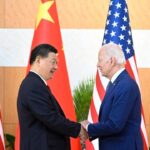Speaking on the sidelines of a conference exploring ways to diversify German business investments in Asia, German Economy Minister Robert Habeck has, once again, stepped up his exaggerated hype of the “dangers of excessive reliance on single trading partners.”
“Germany needs to diversify its business interests in Asia to reduce dependency on China,” Habeck was quoted by Deutsche Welle (DW) as saying on Sunday.
In the era of global interdependence, it won’t necessarily be a bad thing if some German politicians prompt their country to diversify its trade partners and strengthens its economic ties with Asian countries, but this ought to be based on a win-win approach, not on a zero-sum mentality.
The whole of the East Asia and Southeast Asia is an attractive market for German companies due to the increasing consumption-oriented middle class and stable growth forecasts in the region. It’s natural that Germany is seeking to develop its economic relations with countries in the region. The two sides have enjoyed a sound foundation for mutually beneficial economic cooperation, which will help promote regional economic integration and raise the level of economic development of the whole region of East Asia and Southeast Asia.
German politicians can prompt their country to diversify its business interests, but should prevent the trap of a zero-sum game and avoid being dragged into a Cold War mind-set. At the very least, any words or acts aimed at inciting hostility or discrimination against Chinese investment and companies should be avoided.
Asked how Berlin might encourage German companies to invest in other Asian economies, Habeck said the government was considering revisions to its guarantees on German companies’ investments abroad, DW reported.
While it remains to be seen whether Habeck’s words will become a reality and to what extent his remarks represent the voice of the German government, it should be pointed out that it is inappropriate for a country’s economic minister to look at matters related to any single country with a discriminatory attitude.
It is unnecessary to worry about the so-called dangers of excessive reliance. Of course, China remains a strategically important market for many German companies, but this is fundamentally a result of market choice. China still has huge potential in terms of domestic consumption, which attracts a lot of German companies to trade with. The so-called excessive reliance, to some extent, reflects only Chinese market’s attraction for foreign investment and German companies’ success in developing the Chinese market. Some politicians have been calling for artificially reducing “dependency” on China, such efforts will do nothing but harm the interests of German companies.
German Chancellor Olaf Scholz visited China earlier this month with a big team of Germany’s top business executives, sending a clear message: There is huge potential for bilateral economic cooperation. Scholz’s visit has further enhanced the mutual trust and deepens practical cooperation.
A friendly atmosphere between the two countries is the basis for German enterprises to engage deeply into the Chinese market, and the hard-won result should not be undermined by the “decoupling China” theory.
China has served as Germany’s most important trading partner for six consecutive years. Now, the two sides should further enhance cooperation and strive to find mutually acceptable solutions to problems that arise in existing cooperation. Bilateral economic ties should go forward, not backward.
(Global Times)




